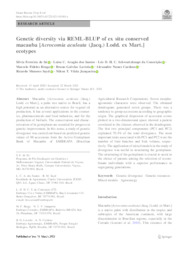Genetic diversity via REML-BLUP of ex situ conserved macauba [Acrocomia aculeata (Jacq.) Lodd. ex Mart.] ecotypes.
Genetic diversity via REML-BLUP of ex situ conserved macauba [Acrocomia aculeata (Jacq.) Lodd. ex Mart.] ecotypes.
Author(s): SÁ, S. F. de; SANTOS, L. C. A. dos; CONCEIÇÃO, L. D. H. C. S. DA; BRAGA, M. F.; LAVIOLA, B. G.; CARDOSO, A. N.; SAYD, R. M.; JUNQUEIRA, N. T. V.
Summary: Macauba [Acrocomia aculeata (Jacq.) Lodd. ex Mart.], a palm tree native to Brazil, has a high potential as an alternative source for vegetal oil production. It has several applications in the cosmetics, pharmaceuticals and food industries, and for the production of biofuels. The conservation and characterization of its germplasm are essential for progress in genetic improvement. In this sense, a study of genetic divergence was carried out based on predicted genetic values of 88 accessions form the Active Germplasm Bank of Macauba of EMBRAPA (Brazilian Agricultural Research Corporation). Seven morpho-agronomic characters were observed. The obtained dendrogram generated seven groups. There was a tendency to group accessions according to geographic origin. The graphical dispersion of accession scores plotted in a two-dimensional space showed a pattern correlated to the clusters observed in the dendrogram. The first two principal components (PC1 and PC2) explained 70.4% of the total divergence. The most important traits associated with PC1 and PC2 were the number of fruit bunches and fruit volume, respectively. The application of mixed models in the study of divergence was useful in structuring the germplasm. The structuring of the germplasm is crucial to assist in the choice of parents aiming the selection of recombinant individuals with a superior performance in segregating generations.
Publication year: 2021
Types of publication: Journal article
Unit: Embrapa Grape & Wine
Observation
Some of Embrapa's publications are published as ePub files. To read them, use or download one of the following free software options to your computer or mobile device. Android: Google Play Books; IOS: iBooks; Windows and Linux: Calibre.
Access other publications
Access the Agricultural Research Database (BDPA) to consult Embrapa's full library collection and records.
Visit Embrapa Bookstore to purchase books and other publications sold by Embrapa.

